
Saying existing job placement programs and unemployment benefits treat economic symptoms – such as income inequality – rather than causes, noted African-American economics professor Darrick Hamilton is proposing federally-guaranteed jobs, at living wages, for everyone.
Creating and implementing such a mandate would not only benefit people, but would also in the long run cut costs for such things as Medicare, Medicaid, and jobless benefits, adds Hamilton, president of the National Economic Association.
Hamilton, an associate professor of economics and urban policy at the New School for Social Research in New York City, spoke as part of a day-long conference, co-sponsored by the AFL-CIO, his association – the nation’s leading organization for minority-group economists – and Howard University, the historically black college in D.C.
The Freedom and Justice Conference brought in experts from many fields to discuss race, gender, and economic inequality. They covered topics ranging from how militarization of police leads to confrontations with African Americans to whether “flipping” real estate for quick profits was a third cause of the Great Recession. That crash hurt minorities even more than whites, with net wealth of African-American households pushed down close to zero as a group, Hamilton said. And the jobless rate for recent African-American college graduates is still 12 percent, he noted, as another example.
“Blacks are 50 percent more likely than whites to go into long-term unemployment” when a crash hits “and 33 percent less likely to escape it” when a recovery comes, added AFL-CIO chief economist William Spriggs, who moderated the final session where Hamilton spoke.
Hamilton began his talk by saying that “much of the framing around racial disparity” in income and wealth “is tied to a ‘culture of poverty’ and low acquisition of education.”
That’s tantamount to blaming the victim, though he did not use those words.
Instead, policy should focus on lack of available jobs, even when the economy is going full-blast, for African-Americans and other minorities. Policymakers, Hamilton declared, should be “addressing labor market conditions” that create poverty “in the first place.”
And to solve those, he declared, “The better choice is a job guarantee.”
Policymakers, he said, have put “an overemphasis on education” as a solution to problems of race, income, and wealth.
“That follows from the neoliberal perspective that the ‘free market’ is supposed to be the solution to all of our problems. But it does not address underlying structures of income and wealth disparity.” And, he said, “the unemployed themselves want to work.”
His program, presented to the group, includes guaranteed jobs for all, with a minimum salary of $23,000 yearly, along with $10,000 worth of guaranteed benefits, such as health insurance and pensions. A Duke University colleague helped assemble the program, he said.
But more highly-trained people would have a higher income guarantee, Hamilton added, based on their skill sets and the available jobs. His proposed program includes “public infrastructure support for developing both physical capital” – roads, bridges, subways, railroads, airport, broadband, etc. – “and human capital,” such as investing to make child care, health care, and care of the elderly well-paid, well-skilled work.
He pointed to the need for more worker training and apprenticeships, a point other speakers also emphasized. As one noted, not every high school graduate needs to get a four-year college degree to find a high-paying job. Community college degrees in technical fields and union-run building trades apprenticeship programs also lead to well-paid employment.
Hamilton also spoke of the need to increase “access to capital” for minorities, who in turn could set up enterprises to employ more people. Other conference speakers noted a higher proportion of African-American-owned banks failed during the Great Recession, compared to the whole industry, and that firms owned by Spanish-speakers are predominantly small, family-owned, and lack the necessary capital to expand.
Hamilton calculated the guaranteed jobs program would cost $750 billion yearly, less than the $787 billion economic stimulus package Congress enacted in 2009. “Blacks were grossly underrepresented in the stimulus” spending, due to its business tax cuts, he added.
He also contended the annual program costs would be offset by lower Medicare, Medicaid, and unemployment benefit expenses, as well as lower health care spending. And the guaranteed income would be “far more efficient than using the tax code,” as conservatives and Republicans propose, with constant tax cuts, deductions, and credits.
But after a panel moderator pointed out that opinion polls show “many white people are reluctant to support policies if they believe they’ll benefit blacks,” Hamilton admitted the jobs program “would be vulnerable to counterattack” politically, with foes using cost as a wedge.
Still, polls show that “over 50 percent of Americans overall” support a federal job guarantee, he said. “I see the problem” of enacting such a program “as a political, not an economic, problem. So I applaud the movements taking place right now” for well-paying jobs and economic justice, Hamilton concluded.
Photo caption: Professor Darrick Hamilton addresses a panel on August 10 at a conference co-hosted by the National Economic Association and the AFL-CIO in Washington, D.C. | C-SPAN

MOST POPULAR TODAY

Zionist organizations leading campaign to stop ceasefire resolutions in D.C. area

High Court essentially bans demonstrations, freedom of assembly in Deep South


Afghanistan’s socialist years: The promising future killed off by U.S. imperialism

Communist Karol Cariola elected president of Chile’s legislature






Comments